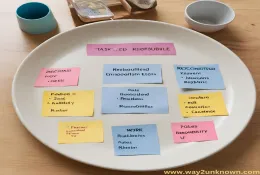Emancipation
Emancipation denotes liberation from oppressive conditions, such as slavery, discrimination, and inequality. It encompasses historical movements like the abolitionist struggle for freedom from enslavement and extends to contemporary efforts to dismantle systemic barriers based on race, gender, and other factors. Embracing legal reforms, cultural shifts, and grassroots activism, emancipation strives to ensure every individual's autonomy, dignity, and equal opportunities in society.
 "It's on my plate" metaphorically signifies taking responsibility for a task or obligation. The phrase emphasizes personal ownership and readiness to address challenges or duties. It implies prioritization, organization, and a proactive attitude towards problem-solving.
"It's on my plate" metaphorically signifies taking responsibility for a task or obligation. The phrase emphasizes personal ownership and readiness to address challenges or duties. It implies prioritization, organization, and a proactive attitude towards problem-solving. "Put it on my radar" is a phrase indicating a request to be informed or reminded about a particular matter in the future. It implies a proactive approach to staying updated and involved in relevant issues or tasks. By using this phrase, individuals express their readiness to monitor and address the subject as necessary, fostering effective communication and collaboration.
"Put it on my radar" is a phrase indicating a request to be informed or reminded about a particular matter in the future. It implies a proactive approach to staying updated and involved in relevant issues or tasks. By using this phrase, individuals express their readiness to monitor and address the subject as necessary, fostering effective communication and collaboration. "Pick your brain" is an informal phrase used to request insights, advice, or information from someone based on their expertise. It signifies a desire to learn from the individual and taps into their knowledge or experience on a particular topic. This expression fosters collaboration and knowledge-sharing, highlighting respect for the other person's expertise while seeking guidance or solutions.
"Pick your brain" is an informal phrase used to request insights, advice, or information from someone based on their expertise. It signifies a desire to learn from the individual and taps into their knowledge or experience on a particular topic. This expression fosters collaboration and knowledge-sharing, highlighting respect for the other person's expertise while seeking guidance or solutions. "Keep me posted" is a request for ongoing updates or information about a particular situation or topic. It indicates interest and a desire to stay informed without imposing pressure on the other party. This phrase is commonly used in both professional and casual contexts, fostering smooth communication and collaboration. By saying "keep me posted," individuals express their openness to receiving updates as they become available, facilitating ongoing dialogue and ensuring all parties remain informed and connected.
"Keep me posted" is a request for ongoing updates or information about a particular situation or topic. It indicates interest and a desire to stay informed without imposing pressure on the other party. This phrase is commonly used in both professional and casual contexts, fostering smooth communication and collaboration. By saying "keep me posted," individuals express their openness to receiving updates as they become available, facilitating ongoing dialogue and ensuring all parties remain informed and connected.
 Ride out the storm" is an idiomatic expression that conveys the idea of enduring a difficult or challenging situation without succumbing to it. The phrase originates from the literal act of navigating through a storm while on a ship, where sailors must weather the turbulent seas until the storm passes. Metaphorically, it symbolizes perseverance, resilience, and the ability to withstand adversity with patience and fortitude.
Ride out the storm" is an idiomatic expression that conveys the idea of enduring a difficult or challenging situation without succumbing to it. The phrase originates from the literal act of navigating through a storm while on a ship, where sailors must weather the turbulent seas until the storm passes. Metaphorically, it symbolizes perseverance, resilience, and the ability to withstand adversity with patience and fortitude. "Jumping through hoops" is an idiomatic expression describing the process of completing difficult or tedious tasks to achieve a goal. It originated from the image of performers leaping through hoops in a circus. Metaphorically, it signifies the exertion of significant effort to meet expectations or navigate bureaucratic hurdles. This expression conveys a sense of frustration at the burdensome obstacles individuals must overcome to accomplish their objectives.
"Jumping through hoops" is an idiomatic expression describing the process of completing difficult or tedious tasks to achieve a goal. It originated from the image of performers leaping through hoops in a circus. Metaphorically, it signifies the exertion of significant effort to meet expectations or navigate bureaucratic hurdles. This expression conveys a sense of frustration at the burdensome obstacles individuals must overcome to accomplish their objectives.
 "Get the hang of it" means to become proficient or skilled at something through practice and experience. It acknowledges the process of initially struggling with a new task or concept before gradually gaining understanding and mastery. This idiom emphasizes the importance of persistence and dedication in learning and highlights the eventual achievement of proficiency through continued effort.
"Get the hang of it" means to become proficient or skilled at something through practice and experience. It acknowledges the process of initially struggling with a new task or concept before gradually gaining understanding and mastery. This idiom emphasizes the importance of persistence and dedication in learning and highlights the eventual achievement of proficiency through continued effort. "Turn a blind eye" is an idiom meaning to deliberately ignore or overlook something, typically of moral concern. It originated from an anecdote involving Admiral Horatio Nelson during the Battle of Copenhagen in 1801. The phrase signifies a conscious choice to disregard or avoid addressing an issue, whether due to fear, bias, or a desire to evade confrontation, with potential consequences on both individual and societal levels.
"Turn a blind eye" is an idiom meaning to deliberately ignore or overlook something, typically of moral concern. It originated from an anecdote involving Admiral Horatio Nelson during the Battle of Copenhagen in 1801. The phrase signifies a conscious choice to disregard or avoid addressing an issue, whether due to fear, bias, or a desire to evade confrontation, with potential consequences on both individual and societal levels. The phrase "get your ducks in a row" advises organizing tasks or elements systematically before proceeding with an endeavor. It emphasizes the need for proper planning, coordination, and preparation to ensure smooth progress and success. By aligning tasks and resources effectively, individuals can enhance productivity and achieve desired outcomes efficiently.
The phrase "get your ducks in a row" advises organizing tasks or elements systematically before proceeding with an endeavor. It emphasizes the need for proper planning, coordination, and preparation to ensure smooth progress and success. By aligning tasks and resources effectively, individuals can enhance productivity and achieve desired outcomes efficiently.